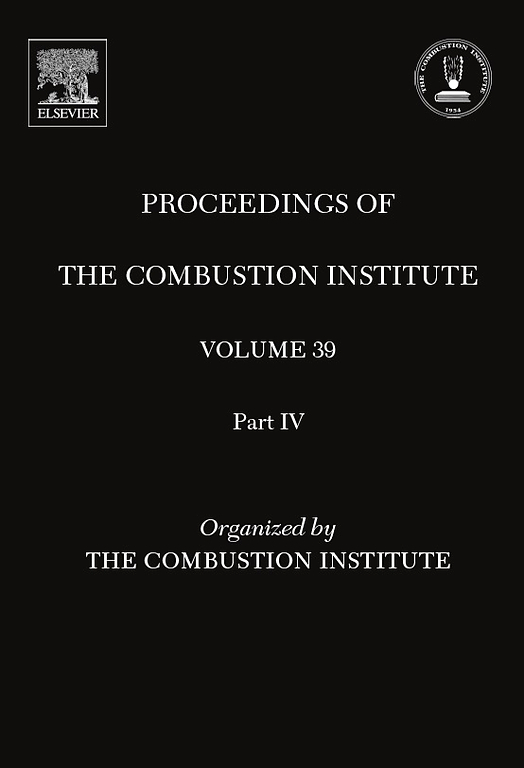超声速燃烧的小火焰/进度变量方法评价
IF 5.2
2区 工程技术
Q2 ENERGY & FUELS
引用次数: 0
摘要
表格化学模型,包括小火焰/进程变量方法,已经成功地用于各种湍流火焰模拟。progress变量描述了系统中反应的过程,并参数化了热化学变量的查找表。这种方法减少了模拟的成本,只传输一个标量(进程变量),而不是详细化学所需的许多物种质量分数。最初是为低马赫数火焰模拟而开发的,最近的工作重点是将这种方法扩展到可压缩火焰、超音速燃烧和爆震,应用于超燃冲压发动机燃烧室和旋转爆震发动机。与低马赫数模拟不同,可压缩流动模拟需要求解能量输运方程,该方程与状态方程耦合。这导致了关于热力学及其对化学的影响的额外建模挑战。模拟假设的有效性,例如能量和温度之间的关系,也随燃烧状态而变化。目前的工作提供了一个详细的评估现有策略的化学制表的可压缩/超音速燃烧,包括爆轰。先验分析表明,对于弱可压缩火焰合理的近似对于激波燃烧可能失效。分析确定了不适用爆轰的特定假设和近似,强调在应用表化化学模型超出其预期燃烧范围时必须小心。本文章由计算机程序翻译,如有差异,请以英文原文为准。
Assessment of flamelet/progress variable methods for supersonic combustion
Tabulated chemistry models, including the flamelet/progress variable approach, have been successfully used for a variety of turbulent flame simulations. The progress variable describes the progress of reactions in a system and parameterizes a lookup table of thermochemical variables. This approach reduces the cost of simulations, transporting only one scalar (progress variable) instead of the many species mass fractions required for detailed chemistry. Originally developed for low Mach number flame simulations, recent works have focused on extensions of this approach to compressible flames, supersonic combustion, and detonations, with applications such as scramjet combustors and rotating detonation engines. Unlike low Mach simulations, compressible flow simulations require solving the energy transport equation, which is coupled to the equation of state. This leads to additional modeling challenges regarding the thermodynamics and its impact on the chemistry. The validity of modeling assumptions, for example the relationship between energy and temperature, also varies with the combustion regime. The present work provides a detailed assessment of the existing strategies for chemistry tabulation for compressible/supersonic combustion, including detonations. A priori analysis indicates that approximations which are reasonable for weakly compressible flames may break down for shock-induced combustion. The analysis identifies specific assumptions and approximations that do not hold for detonations, emphasizing that care must be taken when applying tabulated chemistry models outside their intended combustion regimes.
求助全文
通过发布文献求助,成功后即可免费获取论文全文。
去求助
来源期刊

Proceedings of the Combustion Institute
工程技术-工程:化工
CiteScore
7.00
自引率
0.00%
发文量
420
审稿时长
3.0 months
期刊介绍:
The Proceedings of the Combustion Institute contains forefront contributions in fundamentals and applications of combustion science. For more than 50 years, the Combustion Institute has served as the peak international society for dissemination of scientific and technical research in the combustion field. In addition to author submissions, the Proceedings of the Combustion Institute includes the Institute''s prestigious invited strategic and topical reviews that represent indispensable resources for emergent research in the field. All papers are subjected to rigorous peer review.
Research papers and invited topical reviews; Reaction Kinetics; Soot, PAH, and other large molecules; Diagnostics; Laminar Flames; Turbulent Flames; Heterogeneous Combustion; Spray and Droplet Combustion; Detonations, Explosions & Supersonic Combustion; Fire Research; Stationary Combustion Systems; IC Engine and Gas Turbine Combustion; New Technology Concepts
The electronic version of Proceedings of the Combustion Institute contains supplemental material such as reaction mechanisms, illustrating movies, and other data.
 求助内容:
求助内容: 应助结果提醒方式:
应助结果提醒方式:


